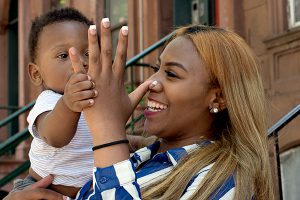Work Life Matters By Peter Provet, Ph.D.
Family focused treatment rebuilds communities
As one of today’s leading providers of substance abuse and mental health treatment, Odyssey House offers a broad range of services focused on helping individuals and families heal themselves.
This family-focused approach has resulted in increased client retention and improved stabilization of previously fragile family units – both important indicators of a successful and sustained recovery.
Odyssey House programs are based in and around New York City. The agency was established in 1967 in response to the heroin epidemic that was devastating America’s urban areas. It started as a small program primarily treating adult drug abusers and has grown into a large organization with multiple sites, more than 300 employees and the capacity to treat more than 900 men, women, and children.
Its growth has been both consistent and measured. The agency was one of the first to offer residential therapeutic community treatment – a cost-efficient, self-help methodology that is now the treatment of choice for hard-core addicts – and to combine this with medical, psychological, educational and housing services.
The impact of drug and alcohol abuse on the American workplace is staggering. According to the US Department of Labor, the annual cost to employers is estimated at $242 billon, which takes into consideration lower productivity, absenteeism, and accidents stemming from addiction.
Efforts to reduce this business liability include raising awareness through prevention campaigns, community outreach efforts, and providing access to treatment through employee assistance programs and rehabilitation services.
It is for these reasons that Work Life Matters magazine has chosen to profile Odyssey House as a Top Work Life Non-Profit Agency.
Family-Friendly Services
The first thing that strikes visitors to an Odyssey House facility is the warmth of the welcome they receive, the attentiveness to their needs, and overall sense of calm and purpose emanating from the men and women they meet. Not that unusual, perhaps, in many corporate offices, but it is surprising to a visitor who knows that the who knows that the majority of the individuals encountered are in treatment for chronic drug abuse.
Along with encouraging substance abusers to face up to their addiction and fully engage in treatment, Odyssey House works hard at dispelling myths about addiction, such as it is limited to certain types of people. The treatment population at Odyssey House is representative of human society from young mothers with newborn babies and toddlers, to teen-agers, young adults, and senior citizens. Many residents are referred for treatment from homeless shelters, criminal justice agencies, medical clinics and hospitals; others by schools or concerned family members. Some are without a place to live, many are jobless, and most lack hope for a better life.
“Odyssey House is in the business of putting people back together and getting them involved in work, family, and community life. At UPS we share and support those values and understand that business prospers where communities are strong. As a board member of Odyssey House I am proud to do what I can to give folks in need a helping hand.”
– Neil Brawley Human Resources Systems Manager, United Parcel Services
Providing a Home and Hope
Many substance abusers enter treatment with a profound sense of loss and hopelessness that if not immediately addressed, can hinder their chances of achieving a successful recovery. Grown men and women, many of whom are parents, and/or grandparents, enter treatment without an understanding or appreciation of what it means to be a member of a family. They are typically surprised at how safe and secure they feel in facilities with as many as 300 other substance abusers and quickly respond to the structure and discipline of treatment regiments.
The underlying treatment philosophy is that the treatment community is a family of residents, where each member has clear responsibilities. All residents, for example, must help operate the facility in which they live and are given tasks (such as cleaning, cooking, or clerical support) that increase in status as they progress through treatment. Such structure and accountability prepare residents to tackle the challenges of life when they re-enter society.
Keeping Mom and Kids Together
Odyssey House is one of only a handful of treatment programs in the country where parents and children live together in residential facilities. Women substance abusers state that leaving their children behind is the number one deterrent to entering treatment. Having their children with them helps keep women in treatment longer and provides a rare opportunity that will benefit the children (and mothers) for a lifetime.
At any one time, as many as 210 women and children live in an Odyssey House Family Center program where all services are geared to meeting the needs of families. Families have round-the-clock access to counseling and medical staff, regular consultations with experts in early childhood development, and the opportunity to work with specially trained daycare workers and teachers certified in early childhood education. Taken all together, these services provide a stimulating and nurturing environment for young children, and help inexperienced parents “learn the ropes” of childcare.
Breaking the Cycle
Women, in particular mothers of young children, often enter treatment with a complex range of secondary problems that can undermine their chances of a successful recovery. Many female residents at Odyssey House suffer from depression and other mental health disorders, as well as the traumatic effects of abusive relationships. Their prospects for recovery are further clouded by lack of education and work skills and by child custody issues.
Because many Odyssey House residents come from broken homes and abusive backgrounds, counseling services focus on breaking the cycle of violence in which many of them have been trapped, and on teaching parents how to nurture their children and family life.
While their children are at play, parents learn healthier ways of interacting with their children, and develop supportive relationships with other parents in the program who are facing similar challenges.
Some women, particularly those who have been the victims of childhood sexual abuse, need additional services to help them rebuild their family lives. Odyssey House counselors encourage them to participate in a newly designed Trauma Curriculum where, during a series of supportive group psychotherapy sessions, women help each other develop coping strategies for the future.
By working together in individual family units and in larger therapeutic groups, parents and children learn tolerance and patience. For troubled families the benefit fits include the prospect of a stable home and a productive life – for society every such home and life has a positive effect beyond measure.
Teaching Teens to be Drug-Free
Drug abuse among American teenagers is again edging upward – in particular marijuana abuse. While not all teenager marijuana users will go on to develop chronic substance abuse, a significant number will. At Odyssey House the majority of teens in treatment are there because of negative behaviors and problems associated with chronic marijuana abuse.
To meet the needs of teenage substance abusers, Odyssey House runs the Teen Leadership Center, which integrates substance abuse treatment and education in a full-service residential setting.
Many teenagers entering Odyssey House have little sense of accountability. Worse, they lack hope for their future. Tethered to their pasts, many already have deeply established patterns of substance abuse – often in conjunction with criminal behavior, academic failure, family trauma – and can see no way out. They typically do not look to the years ahead, but focus instead on the moment at hand.
Some teens come from such profoundly broken backgrounds that treatment provides their first-ever experience of a structured, family-like environment. Once in treatment, kids will no concept of how to live harmoniously with others suddenly find themselves having to learn to cooperate and share. They also are expected to monitor and report on one another’s progress, give each other feedback and support, and confront each other in structured groups.
Education First
Improving the educational performance of young residents is a high priority at Odyssey House. Teens in treatment follow a standard New York City high school curriculum, taught by on-site Board of Education-licensed teachers, and classes are geared toward helping students attain high-school diplomas.
In small classes of less than 20 students, previously disruptive youngsters get a chance to develop discipline and organizational skills, learn about teamwork, and explore their unique talents.
Looking beyond high school, Odyssey House vocational counselors guide students through a range of job-training programs or college courses available to them, and help them make the best choices to ensure their future success.
Supporting Treatment
Treatment goals at Odyssey House are to provide the highest quality services to every man, woman, or child in need of treatment. While the focus is on reuniting families and helping people return to their homes, the agency also treats individuals who are without a supportive family network. This population include the long-term homeless, people with mental illness, and individuals with chronic medical conditions such as HIV/AIDS.
While major funding is provided by government agencies such as the New York State Office of Alcoholism and Substance Abuse Services, the Office of Mental Health, and the Department of Health, contributions from private foundations and individuals play an essential role in enabling Odyssey House to develop new treatment services. Private dollars, for example, recently made possible the implementation of parenting skills workshops; specialized social work services for people over 55; and sports and recreation facilities for teens.
Studies show that for every dollar invested in treatment, taxpayers save seven dollars in reduced criminal justice, medical, and social services costs. But treatment does more than save money, it saves thousands of peoples’ lives by giving employees the tools they need to return to the workplace, helping parents take responsibility for their children, and getting teens back on track.
“What attracted me to the Board of Odyssey House was the long-term commitment of Odyssey to helping people with substance abuse problems give up drugs and learn to live productive lives. It seemed to me a process of redemption whereby, through discipline, medication, and “tough love,” many people were able to move from a dark place to a place of light and hope. The Board helps facilitate the redemptive program by setting policy, helping management with strategic planning and raising funds to enhance new and existing programs.”
– George Rosenfeld Chairman, Odyssey House Board of Trustees
(for 30 years an arbitrage broker on the American Stock Exchange).
 For more than two decades, George Rosenfeld has helped lead and shape Odyssey House. His visionary and compassionate public service leadership as Chairman of Odyssey House (2002–2012) and then as Chairman of Odyssey Foundation has helped save the lives of thousands of men and women suffering from substance use and mental health disorders.
For more than two decades, George Rosenfeld has helped lead and shape Odyssey House. His visionary and compassionate public service leadership as Chairman of Odyssey House (2002–2012) and then as Chairman of Odyssey Foundation has helped save the lives of thousands of men and women suffering from substance use and mental health disorders.

 Helping women and families rebuild their lives is a priority. Our gender-specific treatment programs for
Helping women and families rebuild their lives is a priority. Our gender-specific treatment programs for  We created the Odyssey House
We created the Odyssey House 

 In mid-2016, Jacqueline, 36, pregnant with her third child, nearly had to make that choice. Unable to find a program that could help her in her hometown of Boston, and desperate to get sober, Jacqueline came to New York and began treatment at Odyssey House.
In mid-2016, Jacqueline, 36, pregnant with her third child, nearly had to make that choice. Unable to find a program that could help her in her hometown of Boston, and desperate to get sober, Jacqueline came to New York and began treatment at Odyssey House.